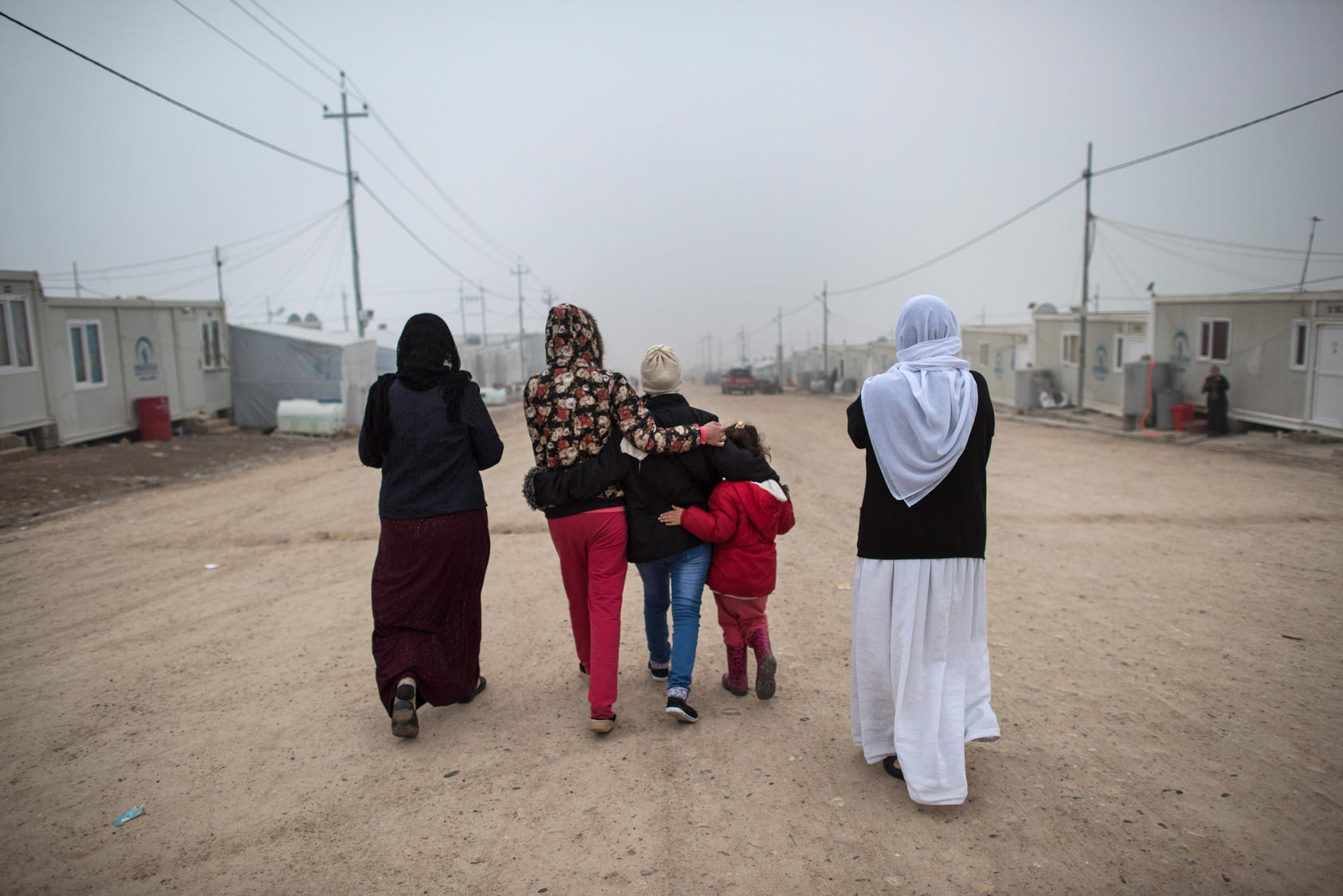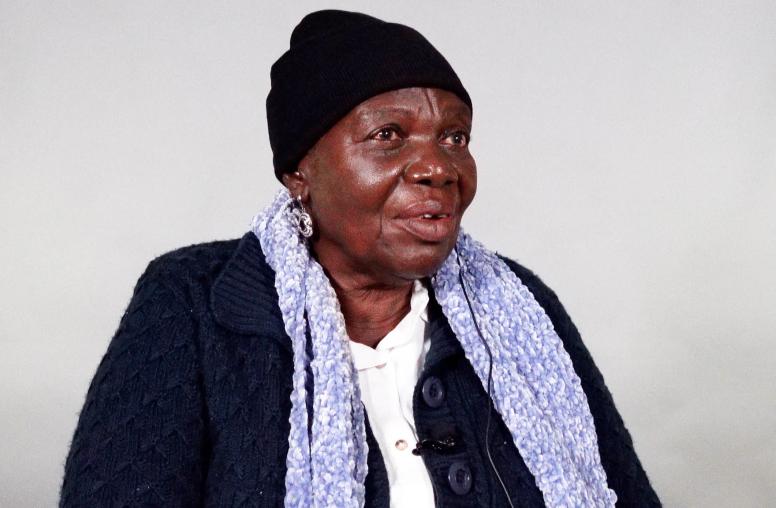ISIS Makes Sex Slavery Key Tactic of Terrorism
Action Against Violent Extremism Must Address Abuse of Women, U.N. Official Says
The sexual violence committed against women and girls by the Islamic State of Iraq and Syria (ISIS) can only begin to be addressed with a multipronged response from the global to the local level, said Zainab Hawa Bangura, the United Nations’ point person on the issue. Speaking at the U.S. Institute of Peace, Bangura cited work ranging from promotion of U.N. resolutions to talks with religious leaders to suggest how the brutal, systematic sexual slavery imposed by the extremist group might be undermined.

Bangura called for a shift in mindset on ISIS’s violent oppression of females, particularly the religious minority women of Iraq and Syria who have been captured—and often sold multiple times—as sex slaves for the group’s fighters and officials. These women are victims of terrorism, she said, and their plight should be prioritized in every plan for countering violent extremism.
“When we think of terrorism, we tend to think of hijacking, hostage taking, explosions and property destruction,” she said. “But we cannot deplore the public face of terrorism, while ignoring the violence that terrorists inflict on women and girls in private, behind closed doors.”
Bangura and other experts at the event, co-sponsored with the McCain Institute for International Leadership, agreed there is no way to influence the conduct of ISIS because it acts outside virtually every norm of international law and accepted conduct. The same is true of extremist groups operating in 19 countries examined in her last report to the U.N. Security Council, Bangura said. All of them use sexual violence as a way to break communities and control populations—a tactic of war and terrorism. Viable approaches to countering ISIS’s sexual violence involve working to delegitimize its ideology and degrade its capabilities, she said.
“This is not a women’s issue,” said Cindy McCain in remarks opening the Oct. 5 discussion. “It’s an issue of peace, of human rights and of terrorism. That’s the distinction we have to make.”
Strategic Use of Sexual Violence
The strategic use of sexual violence in Iraq did not begin with ISIS, said Sarhang Hamasaeed, a USIP senior program officer for the Middle East. As an Iraqi Kurd, Hamasaeed said he had been a “semi-eyewitness” to Iraqi President Saddam Hussein’s military assault known as the Anfal in Iraq’s Kurdish region in 1987-88. In addition to slaughtering thousands of Kurds, the Baath Party carted off an unknown number of women. At the secret police headquarters in Suleimaniyah, Hamasaeed said he saw, after the regime fell, a trailer where women were taken to be raped. ISIS, for its part, justifies raping and enslaving women from Iraq’s small Yazidi religion because they are non-believers in Islam.
“Many ISIS commanders are ex-Baath Party,” Hamasaeed said. “The muscle memory is there—the mind-set for managing such complex operations.” Religion is cited, but it’s not the actual trigger, he said.
Even so, ISIS’s brutality stands out among extremist groups and amid the modern history of sexual violence in war, Bangura said. The group not only has an elaborate fatwa from its leader on the rules for enslavement and rape, it has an official office to manage the market in women, who are bought and sold online and in an open slave bazaar in Raqqa, Syria, the capital of the self-proclaimed caliphate.
In her capacity as Special Representative of the Secretary-General on Sexual Violence in Conflict since 2012, Bangura has interviewed dozens of Yazidi women who escaped from ISIS; 3,000 remain in captivity she said. ISIS is using drugs to hasten young girls’ physical maturation and boost their market value; she talked to women resold as many as eight times.
Curbing ISIS sexual violence requires a multidimensional approach, Bangura said.
Responsibility to Act
At the global level, the Anti-ISIL Coalition, which uses another acronym for the militants, needs to focus on stripping resources from the group and degrading its ability to communicate, travel and trade, she said. Social media platforms are the “the oxygen of ISIS.”
“That’s the responsibility of member states,” she said. “We don’t control it.”
Regional organizations need to be mobilized, as the League of Arab States was in a recently signed framework of cooperation with her office, she said. The agreement seeks to foster closer collaboration on conflict-related sexual violence, while acknowledging “complex cross-border challenges,” Bangura said.
An agreement Bangura’s office signed two weeks ago with the government of Iraq illustrates possibilities on the national level, she said. The pact calls for the government to push for justice and accountability through measures such as strengthening the legal framework on sexual violence, and to work on providing a range of psychological and medical support for victims. Equally important, it highlights the role of civil society in ensuring that women who suffer sexual violence are seen as the victims and survivors that they are, without stigma.
Religious leaders also are critical to the fight, said Bangura, a Muslim from Sierra Leone. In a meeting in Cairo with the Grand Imam of al-Azhar University, known as Sunni Islam’s leading institution, Bangura said she argued that “a press release is not enough.” Her office is working with al-Azhar to bring together religious leaders from countries affected by sexual violence by terrorists to discuss it and create an alternate narrative.
Referring to ISIS’s leader, she said: “You cannot just sit there and allow al-Baghdadi to issue a fatwa justifying sexual slavery in the name of Islam.”
The spiritual leader of the Yazidis played a key role in winning acceptance and reintegration of sexually violated girls and women—a break from traditional attitudes, she said. The Yazidis are a small minority who suffered massive upheaval and loss when ISIS overran their communities in northern Iraq in 2014.
They realized “they had to rescue their girls,” Bangura said.
Captive women heard they would be welcomed back by their families, inspiring escapes and sharply reducing their suicide rate. The Yazidis built networks to help captive women, including gathering funds to purchase their freedom.
“We have tried to replicate this with others,” Bangura said. “It has not been possible.”
One benefit of the Yazidi’s supportive approach is the willingness of the group’s women to tell their stories and confront the world with their suffering and ISIS’s savagery, Bangura said.
“These women and girls are not abstract statistics,” Bangura said. “They are human beings; mothers, daughters and sisters.”
Women who have been subject to sexual abuse by violent extremists should be treated with the care and respect accorded to other victims of terrorism, said Kathleen Kuehnast, senior gender advisor at USIP, after the event. Benefits often include medical, economic and other support as well as reparations.
“They are victims of terrorism,” Kuehnast said.



